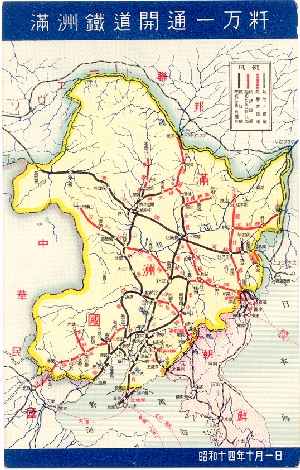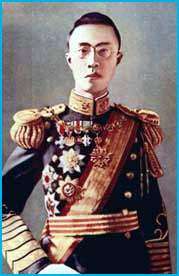
|
|
|
|
|
|
|
|
|
|
|
|
|

The first significant step toward conquest of Manchuria was the Sino-Japanese War of 1894-5. In the previous century, Asia had been opened up to the West. China was more or less colonized after the First and Second Opium Wars and the Arrow War. European powers carved out chunks of China for themselves. The United States’ open door notes ensured American access to newly opened Chinese markets. Japan, however, had a “tradition of limited or nonexistent international relations” (Hayes 32). Thus, Japan had limited experience in foreign relations and a rather neutral feeling toward most of its neighbors. This feeling of neutrality would soon change, however, as Europeans had great success in exploiting China.
Japan couldn’t possibly exert any power over other continents or regions of the world. It had no resources to do such and, as such, the only logical thing to do was gain power at the expense of other Asians (Hayes 32). A religious rebellion in south-western Korea allowed an opportunity for the Japanese to exert power in the region “in order to maintain the balance of power between Japan and China” (Tsuzuki 124). On July 17, 1894, a decision was made in Japan to go to war with China, ultimatums were given to China and Korea, and war was officially declared on August by the Emperor of Japan (Tsuzuki 126). Japanese troops landed in Korea and swept up the peninsula, crushing the Korean and Chinese forces. The result of this domination of the supposedly powerful and strong Chinese led to an increased image of the Emperor Meiji and a sense of national pride. Nationalism, a new sense of a need for expansionism, and a growing number of conservative Japanese would lead to more clashes with foreign powers, namely Russia only a decade later.
The more tangible results of the first Sino-Japanese War were outlined in the Treaty of Shimonoseki. China was forced to recognize complete Korean independence, and a “treaty port system” was established, opening four Chinese ports to Japanese trade. This was an imperial war for both countries, and a war of conquest for Japan. By emerging the victor, they had proven the fact that, in order to see to their own interests, they needed to take advantage of their weaker neighbors.
Russian ambitions had been running high lately. During the conflict between China and Japan, the Russians had sent a fleet through the Suez canal for possible intervention in the clash. Nationalism was building in Japan and proponents of democracy were forced by public pressure to join the “patriotic battle-cries” of Japan (Harvey 116). The army and navy were lifted to legendary status and the Japanese people were hungry for military success and conquest. With the Russians becoming increasingly bold in their movement into areas of Japanese interest, namely Manchuria and the acquired Liaotung Peninsula (Harvey 117). Japan bided its time and sought alliances with foreign powers suspicious of the Russians. War with Russia was inevitable and the Japanese began building their army and navy even more for the imminent clash.
The Boxer Rebellion of 1900 in China led to more Japanese problems with Russia. As the Boxers swept across China, the Tsarist forces moved large numbers of troops into Manchuria to protect their interests. This, of course, angered the Japanese and was seen as, basically, a declaration of war. For three years, the Japanese used diplomacy in order to get the Russians out of Manchuria, but they would not move Finally, in December of 1903, Japanese troops flooded Korea to undertake a massive assault on Russian troops in Manchuria. Massive battles involving the trench warfare that would be prominent in the First World War occupied the Japanese and, with lesser significance, the Russians until the American-brokered Portsmouth Peace Conference of 1905 (Harvey 119). The task of peace fell to Foreign Minister Komura Jutaro, who gained control of control over Korea, recognition of Manchuria as a territory of special interest, and control of Russian concessions there, most importantly the South Manchurian Railway (Barnhart 40). Japan had beaten a major European power and the surge of nationalism and imperialism could not be slowed.
The Russian menace eliminated, the west portrayed as weak against Japanese militarism, the people of Japan becoming more and more ambitious, more demands were made of China. The “twenty-one demands” of 1915 would have forced China to give up control over foreign relations and global commerce interactions (Hayes 49). This effort was put forth in order to gain a more firm hold of Manchuria, the ultimate end goal for that region of Asia. Japanese ambitions would spread after World War I and into World War II, but Manchuria was their primary goal, the model for what a conquered state would be.
With growing control and dominance of Asia, Japan was asserting itself more and more in the region. Nothing mattered more to the Japanese than a greater Japan and there was no better way to achieve a greater Japan than to expand and increase the borders of the empire. Conquest of Manchuria was the major goal of Japan, but the way in which it was conquered and the way in which the “independent” state of Manchukuo was formed was a point of contention amongst the government and military.
Opposition to Japanese influence in Manchuria was
growing strong and strong throughout China and in Manchuria itself.
In 1928, the warlord of the region, Chang Tso-lin, was murdered and succeeded
by his son, Change Hsueh-liang (Hunter 120). The Kwantung Army, a
Japanese military force in Manchuria began slowly ignoring the desires
of Tokyo and, on the night September 18, 1931, a group led by Ishiwara
Kanji and Itagaki Seishiro carried out a plot to bomb a rail car near the
city of  Mukden
and allow for the complete military occupation of Manchuria (Hunter 120).
The Japanese government was opposed to this, but could not stop the military
leaders. Within four days, the Manchurian capital at Changchun was
captured, reinforcements were sent in without government permission, and
field officers were ignoring commands from Tokyo in order to overrun Manchuria.
Mukden
and allow for the complete military occupation of Manchuria (Hunter 120).
The Japanese government was opposed to this, but could not stop the military
leaders. Within four days, the Manchurian capital at Changchun was
captured, reinforcements were sent in without government permission, and
field officers were ignoring commands from Tokyo in order to overrun Manchuria.
The rest of Asia, needless to say, was furious. China was especially angered by the sudden Japanese incursion, scoffing at any suggestion that they were involved in the bombing and that the Japanese were acting in self-defense. There was nothing that they could do, however. Japan now had total control over Manchuria and a weak China had no chance at pushing them out. The Japanese were there to stay for approximately the next fifteen years.
In February of 1932, the Japan-Manchukuo Protocol was signed. In effect, the document declared the independence of the empire of Manchukuo and more or less guaranteed Japanese control of the region. The Protocol coincided with the recognition of Manchukuo as an independent state. China appealed to the only body that could possibly help them, the League of Nations. Japan merely withdrew from the League and there was no way to stop them short of war. A puppet state had been set up and the last Manchu emperor of China, Pu Yi, was installed as emperor of Manchukuo. The Japanese claimed they wanted “an era of happy coexistence and mutual prosperity” with the Manchu people (Thomas 171). In reality, they wanted control of the region and all of the resources they could exploit from the puppet state of Manchukuo.
The implications of Japan’s invasion of Manchuria and its recognition of Manchukuo as a “free” state are widespread. Firstly, it signaled a change in foreign policy. Japan realized they could ignore the western powers and come out on top. They didn’t have to listen to the objections of Great Britain and the US. Further along the lines of foreign relations, Japan could also ignore such economic consequences of expansion such as trade restrictions or sanctions. The stock exchange in New York had crashed only three years earlier and the result was global. Threats to “exclude Japan from markets or to deny it access to finance” were not as feared as they would have been only a few decades earlier (Beasley 198). Rather than being hindered or threatened by the other nations of the world, Japan had realized their powerlessness in Asia and was determined to continue.
Once Manchuria was acquired, it seemed only a matter of time before all of Asia fell to the Japanese. Just as the results of the first war with China and the Russo-Japanese War had fueled the fire of imperialism, expansionism, and nationalism, the success in Manchuria did nothing to sate the appetite for dominance. Capturing Manchuria also allowed Japan a foothold on the Asian continent. From there, where their troops were amassed and spread out for the protection of both the Empire and Manchukuo, it was only a short trip to either Korea or China.
Also, Manchukuo would supply Japan with many of the raw materials it would need in order to carry out any sort of expansionist policy. The army and navy were increasing in size and the fervor of the citizens was increasing. Finally, open hostilities erupted and war broke out once again between China and Japan in 1937. The ability of the Japanese to both supply their troops from Manchukuo and base their troops in Machukuo led to the presumption that the conquest of China would be quick and easy. It was neither, as the forces under Chiang Kai-shek fought back ferociously against the Japanese invaders.
Some historians believe that the conquest of Manchuria, the recognition of Manchukuo under Henry Pu Yi, and the inevitable invasion of China were precursors to the Second World War. Clearly, this culmination of forty years of Japanese dominance in Asia dating back to the first Sino-Japanese War was melded into World War II and clearly these events were an integral part of bringing the entire world into war. A connection between Germany, Italy, and Japan was already brewing. Mussolini and Hitler both recognized Manchukuo as a nation, two of only a handful that did. Perhaps as a way of enticing the Japanese to occupy the Russians, Chinese, and European colonial powers, the Axis leaders helped the Japanese in their recognition of the puppet state. The expansionist goals of Japan coincided with the goals of Germany and Italy and it could be legitimately said that the Japanese conquest of Manchuria and the assault on China only a few years later were, in fact, the start of the largest war to sweep the globe.
Barnhart, Michael A. Japan and the World Since 1868. New York: St. Martin's Press, 1995.
Beasley, William G. Japanese Imperialism 1894-1945. New York: Oxford University Press, 1987.
Chushichi, Tsuzuki. The Pursuit of Power in Modern Japan, 1825-995 . New York: Oxford University Press, 2000.
Harvey, Robert. The Undefeated: The Rise, Fall, and Rise of Greater Japan. London: Macmillan, 1994.
Hayes, Louis D. Japan and the Security of Asia. Lanham, MD: Lexington Books, 2001.
Hunter, Janet. Concise Dictionary of Modern Japanese History . Berkeley: University of California Press, 1984.
Thomas, J.E. Modern Japan: A Social History Since 1868. New York: Longman, 1996.
http://www.marxists.org/reference/archive/mao/works/1935/12_27.htm#n1 (Mao's reaction to Japanese aggression)
http://www.mtholyoke.edu/acad/intrel/WorldWar2/manchuria.htm (A US perspective from a State Department report)
http://www.usd.edu/honors/HWB/hwb_u/tojo1.html (A look at Japanese military aggression)
http://www.historylearningsite.co.uk/manchuria.htm (The failure of the League of Nations in 1931)
http://www.royalty.nu/Asia/China/PuYi.html (A look at the life of Henry Pu Yi)
http://www.flags.net/WWIIMANT.htm
(The Manchurian flag)
Site Created by: David Carr